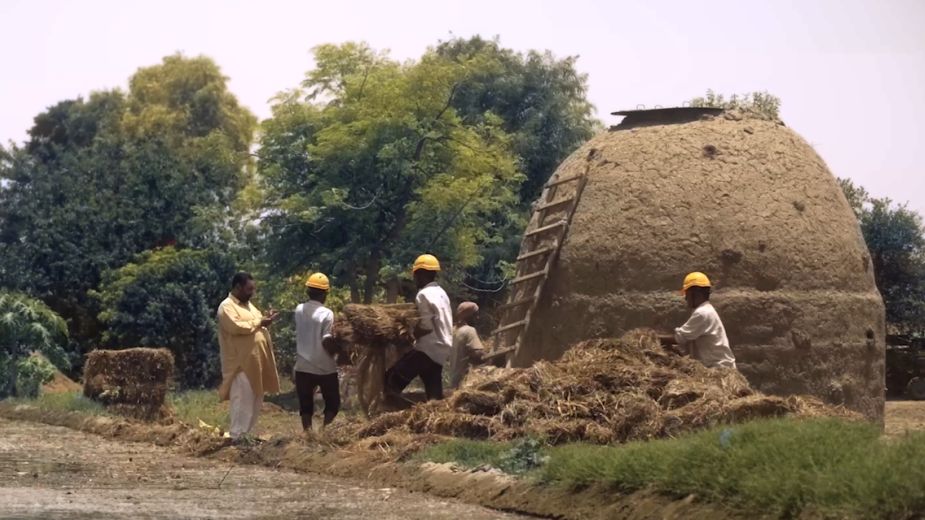
With the Biochar Project, PepsiCo and Leo Burnett Are Hoping to Clear the Skies

From New York to New Delhi, fume-filled skies are becoming a choking normality in 21st-century life. In India, PepsiCo and Leo Burnett have been doing their bit to find a solution that’s sustainable and, hopefully, scaleable.
In Northern India, harvest time sees thick brown haze clog up the skies and lungs. After several years of wearing masks indoors during the covid-19 pandemic, a jarring reverse phenomenon has emerged. People pop their masks on outdoors, to try to filter out the dense, polluting air. It’s a result of a number of things. The plethora of fireworks that pop off come Diwali certainly don’t help, but the key driver is the burning of fields as farmers rush to clear the remnants of the previous harvest and make space for a new cycle. Every year 27 million tonnes of stubble are burned, releasing over 160 million tonnes of greenhouse gases.
As Rajdeepak Das, CEO and CCO at Leo Burnett South Asia and chairman of Publicis Groupe’s South Asia creative council, explains, it’s a huge and multi-faceted problem. “Think of it when the pollution was happening in New York, everyone was saying ‘wahhh, have you seen this? What’s happening?’ It happens in Delhi every winter and everyone goes crazy about it,” he says. “But now, how do you take that and find the solution? Or three or four solutions: pollution, behaviour change and economic.”
What makes the issue particularly tricky is that much of this field burning is carried out by small and marginal farmers, whose livelihoods are precarious and who are under pressure to fit as many crop cycles as possible into a year.
Leo Burnett has been working with PepsiCo for a year, and as part of that relationship they’ve been working together to support the 27,000 farmers that are part of PepsiCo’s network of suppliers.
As Raj explains, finding a solution that cuts pollution while also helping marginal farmers is a complex problem.
“What happens when you do open burning with a lot of oxygen? A lot of smoke happens and Delhi and Haryana become totally choked because of that. It is one of the biggest contributors to air pollution,” he says. Fire is sacred and we can’t stop people burning, they’ve been doing that for years and they don’t know other ways to burn it. There’s pressure on them because they have to do it between two farming cycles.“
Raj found inspiration in the most unlikely of forms - a traditional Indian tandoor oven, a large clay urn-shaped vessel that’s been used in cooking for 5,000 years.
The Biochar Project uses a large clay and brick kiln that farmers can use to burn leftover stubble from their fields. Tiny holes limit the amount of oxygen that can enter the oven, reducing the amount of smoke created, while also more steadily regulating any smoke that is released. What’s more, the oven turns the stubble into a carbon-rich fertiliser, known as biochar. Biochar is an ancient method of soil enrichment dating back thousands of years to the ancient Amazonians, and The Biochar Project’s clever kilns allow farmers to create it easily.
In order to design the Biochar and bring it to life, PepsiCo and Leo Burnett collaborated with Punjab Agricultural University. The beauty of The Biochar Project, says Raj, is that it’s a relatively low-tech and accessible solution. “It costs less than $150 dollars. You need the bricks and mud and they come from the same land. You don’t need anything else.”
The initial pilot in Punjab’s Sangrur district saw a 50% reduction in pollution, along with a 33% reduction in fertiliser spend for farmers and an impressive 19% increase in crop yield.
Of course this is a novel solution to a giant issue and it will take time to see if marginal farmers will adopt this technology en masse. PepsiCo has been working on the ground with their expert agronomist. They’ve been working directly with its 27,000 farmers as well as collaborating with village heads and communities to help build it up.
Crucially, it’s also an invention that can be easily adopted by farmers elsewhere who are facing the same bind. “It can go to other countries. No one owns the copyright here. You build something and give it to people,” says Raj.
Biochar is just one initiative in PepsiCo’s push to spread regenerative farming practices across its supply chain. Their ambition is to propagate regenerative farming in seven million acres by 2030. Biochar was initially revealed in September last year and in March 2023, PepsiCo announced that they would be extending the pilot to the Fatehgarh Sahib and Ludhiana districts in Punjab. What’s more, the project picked up a Silver Lion at this year’s Cannes Lions Festival, in the Sustainable Development Goals category. However, it’s just the beginning for an innovation that has the potential to transform Indian skies.















